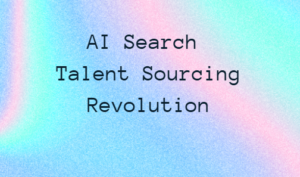
The digital search landscape is undergoing a seismic transformation with the advent of AI-powered search technologies. As Mat Honan’s MIT Technology Review article, “AI Means the End of Internet Search as We’ve Known It,” highlights, we are entering an era where conversational AI redefines how we access information. For recruiting professionals, this new AI-driven search technology promises to revolutionize the way we source, discover, assess, and engage with potential candidates.
From Blue Links to Conversational AI
Traditionally, sourcing talent online involved leveraging search engines to sift through countless pages of resumes, profiles, and articles. The process was keyword-dependent, requiring recruiters to master the “language” of search engines. Now, with conversational AI—like Google’s AI Overviews and ChatGPT’s web search—this paradigm is changing.
Instead of navigating through a series of links, recruiters can ask nuanced questions in natural language and receive synthesized, actionable responses. For instance, a recruiter might ask, “Who are the top data scientists specializing in AI ethics with recent publications?” An AI-powered search engine could deliver a comprehensive list of candidates, their credentials, and even summaries of their work, bypassing the need for manual sorting.
Enhanced Precision and Personalization
AI search excels at contextual understanding, a game-changer for talent sourcing. It can process complex queries, such as, “Find me software engineers with experience in Python and Kubernetes who have worked at startups,” and deliver tailored results. Moreover, these tools draw from live, diverse sources—social media, professional networks, and niche industry platforms—offering a more holistic view of candidates.
This precision extends to personalization. AI can factor in industry trends, company culture, and hiring patterns, presenting candidates who not only meet technical criteria but also align with organizational values. For recruiters, this means less time spent on filtering and more on engaging the right talent.
Real-Time Insights and Decision-Making
As highlighted in Honan’s article, generative AI enables real-time synthesis of information from across the web. In talent sourcing, this capability translates into dynamic market intelligence. Recruiters can quickly gauge industry demand for specific skills, benchmark salaries, and even analyze competitor hiring strategies. These insights empower recruiters to make informed, timely decisions, giving organizations a competitive edge.
Challenges and Ethical Considerations
While the potential of AI in talent sourcing is vast, it comes with challenges. Honan’s article underscores concerns about the reliability of AI-generated answers. For recruiters, inaccurate or biased information could lead to misguided hiring decisions. Ensuring that AI tools use verified, unbiased data sources is critical.
Additionally, ethical concerns arise around privacy. AI’s ability to aggregate and analyze information from diverse sources could inadvertently expose personal data. Companies must adopt transparent practices, ensuring compliance with data protection regulations and fostering trust with candidates.
A New Era for Recruiters
AI’s integration into talent sourcing doesn’t spell the end of the recruiter’s role. Instead, it augments their capabilities. By automating repetitive tasks like candidate screening and market research, AI allows recruiters to focus on high-value activities—building relationships, assessing cultural fit, and crafting compelling employer brands.
- AI Search Will Transform Talent Sourcing Forever - January 10, 2025
- Build an AI Sourcing Assistant using ChatGPT 4 - January 10, 2025
- Top Recruiting Leaders to Follow in 2025 - January 8, 2025
